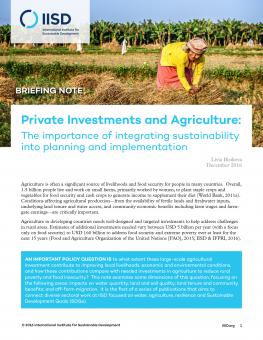
Private Investments and Agriculture: The importance of integrating sustainability into planning and implementation
Recently, we have seen an increase in large-scale investment into agriculture. An important policy question is to what extent these large-scale agricultural investment contribute to improving local livelihoods, as well as economic and environmental conditions.
Agriculture is often a significant source of livelihoods and food security for people in many countries.
Recently, we have seen an increase in large-scale investment into agriculture. Important policy questions are: To what do extent these large-scale agricultural investments contribute to improving local livelihoods, and economic and environmental conditions? And how do these contributions compare with needed investments in agriculture to reduce rural poverty and food insecurity? This briefing note examines some dimensions of these questions, focusing on the following areas: impacts on water quantity, land and soil quality, land tenure and community benefits, and off-farm migration.
Participating experts
You might also be interested in
Good COP? Bad COP?: Food systems at COP29
The 29th United Nations Climate Conference (COP 29) in Baku failed to build on the notable progress made on food systems at COP 28. However, it wasn't all doom and gloom.
What Drives Investment Policy-makers in Developing Countries to Use Tax Incentives?
The article explores the reasons behind the use of tax incentives in developing countries to attract investment, examining the pressures, challenges, and alternative strategies that exist.
New tool empowers businesses to make agriculture and food systems sustainable
Recognizing the critical role investors and businesses can play in driving the transition to more equitable, resilient, and sustainable food systems, the Responsible Agricultural Investment Tool for Agribusiness—developed by IISD and Cerise+SPTF—offers a practical framework for business leaders to understand what responsible practices look like, identify gaps, and prioritize improvements as they seek to align with international principles.
From the ground up
A new soil product that harnesses typha—a component made up of cattails, harvested from Manitoba's wetlands—to reduce peat-based compost in soils, is growing in popularity among Winnipeg gardeners. The idea for the soil came from a finalist in IISD-ELA's Hackathon event, which was then given the start-up funds to get the project off the ground.